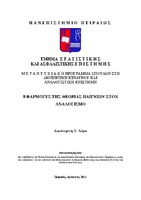Εφαρμογές της θεωρίας παιγνίων στον αναλογισμό
Applications of game theory in actuarial science

Προβολή/
Θεματική επικεφαλίδα
Θεωρία παιγνίων ; ΑσφάλισηΛέξεις κλειδιά
Ασφαλιστικά μαθηματικάΠερίληψη
Η παρούσα εργασία πραγματεύεται την παρουσίαση βασικών εννοιών της Θεωρίας Παιγνίων και την εφαρμογή τους στην επίλυση προβλημάτων που προκύπτουν στον τομέα του αναλογισμού και κυρίως της ασφάλισης. Κάθε πρόβλημα παρουσιάζεται ως παιχνίδι στο οποίο είτε οι παίκτες έχουν αντικρουόμενα συμφέροντα (παιχνίδια μηδενικού αθροίσματος), είτε εμφανίζονται συμμαχίες όπου οι παίκτες συνεργάζονται (συμμαχικά παιχνίδια). Οι παίκτες επιλέγουν από τις διαθέσιμες στρατηγικές τους αυτή που θεωρούν ότι θα τους εξασφαλίσει τη μεγαλύτερη τιμή στη συνάρτηση απόδοσης όταν πρόκειται για κέρδος ή αντίστοιχα τη μικρότερη τιμή στην περίπτωση της ζημίας.
Γενικά ο σκοπός της θεωρίας παιχνίων είναι η εύρεση λύσης με την οποία επιτυγχάνεται η ελαχιστοποίηση της ζημίας ή η μεγιστοποίηση του κέρδους. Στα παιχνίδια μηδενικού αθροίσματος το κέρδος του ενός παίκτη αποτελεί την απώλεια για τον άλλο παίκτη. Το άθροισμα των δύο αποδόσεων ισούται με μηδέν και στο γεγονός αυτό οφείλεται και το όνομά τους. Στα παιχνίδια αυτά μία εξαιρετικά σημαντική ιδιότητα, είναι ότι αν μία λύση οδηγεί τον ένα παίκτη στην καλύτερη δυνατή απόδοσή του, δεδομένης της επιλογής του αντιπάλου, χαρακτηρίζεται ως σημείο Nash. Αναφέρονται οι σχετικές μέθοδοι επίλυσης και δίνονται διευκρινιστικά παραδείγματα.
Σχετικά με τα συμμαχικά παιχνίδια όπου οι παίκτες συμμετέχουν για να επιτύχουν καλύτερες αποδόσεις απ΄ότι αν έμεναν μόνοι τους εξετάζονται οι μέθοδοι κατανομής της απόδοσης που θα επιτευγχθεί. Σ’ αυτή την κατηγορία παιχνιδιών, ο στόχος είναι να κατανεμηθεί η συνολική απόδοση που θα υπάρξει, με τέτοιο τρόπο ώστε η επιμέρους απόδοση που θα λάβει κάθε παίκτης θα είναι ανάλογη της συμμετοχής του (διότι κάποιος παίκτης μπορεί να πληρώσει μεγαλύτερο κόστος για να συμμετάσχει στη συμμαχία και κάποιος άλλος λιγότερο).


